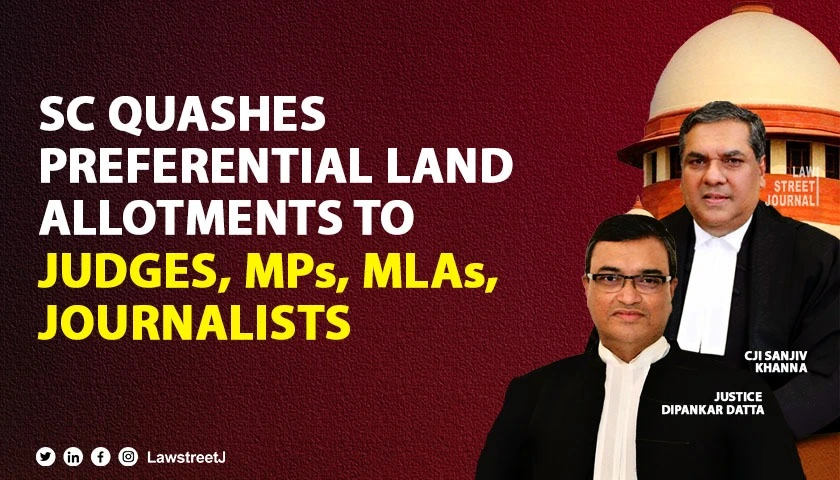NEW DELHI: The Supreme Court has held that the state cannot exercise discretion to benefit a select few elites disproportionately, especially ones who are already enjoying pre-existing benefits and advantages.
SC Strikes Down Preferential Land Allotments for Judges, MPs, and Journalists
A bench of Chief Justice of India Sanjiv Khanna and Justice Dipankar Datta quashed the preferential allotment of lands to the housing societies of MPs, MLAs, civil servants, judges, journalists, etc, within the Greater Hyderabad Municipal Corporation limits.
"Judges of the Supreme Court and the High Court, MPs, MLAs, officers of the All India Services, journalists etc cannot be treated as a separate category for allotment of land at a discounted basic value in preference to others," the court said.
Supreme Court Upholds Equality, Calls Out Arbitrariness in Government Policies
The court cancelled the policy memoranda issued by the Andhra Pradesh government in 2005 and 2007 to allot land to cooperative societies of such people, finding that the core framework of these policies suffered from the malaise of unreasonableness and arbitrariness.
The bench said the allocation of land at basic rates to select privileged groups reflected a “capricious” and “irrational” approach.
"This is a classic case of executive action steeped in arbitrariness, but clothed in the guise of legitimacy, by stating that the ostensible purpose of the policy was to allot land to “deserving sections of society”," the bench said.
It held, without any pretence, this policy of the state government, is an abuse of power meant to cater exclusively to the affluent sections of the society, disapproving and rejecting the equal right to allotment of the common citizen and the socio-economically disadvantaged.
The bench said the policy indicates that higher echelons of all the three wings of the government —legislators, bureaucrats, and judges of the Supreme Court and high courts—have been afforded such preferential treatment, and journalists, who are considered the fourth pillar of democracy, have also been included.
“These four pillars of democracy are expected to act as checks and balances on the arbitrary exercise of the state’s power. However, the distribution of such extraordinary state benefits renders nugatory the very optics of healthy checks and balances within our democratic system,” the bench said.
It also said the object of the policy perpetuated inequality, differentiated and bestowed largesse to an advantaged section or group by resorting to discrimination and denial.
"The policy promotes social-economic exclusion, to favour a small and privileged section/group. The policy does not meet the equality and fairness standards prescribed by the Constitution," the court held.
The bench also noted land is a finite and highly valuable resource, particularly in densely populated urban areas, where access to land for housing and economic activities is increasingly scarce.
"When the government allocates land at discounted rates to the privileged few, it engenders a system of inequality, conferring upon them a material advantage that remains inaccessible to the common citizen. This preferential treatment conveys the message that certain individuals are entitled to more, not due to the necessities of their public office or the public good, but simply because of their status," the bench said.
The court said such practices foster resentment and disillusionment among ordinary citizens, who perceive these actions as corrupt or unjust, thereby eroding trust in democratic institutions.
"This policy undermines solidarity and fraternity, reinforcing societal hierarchies rather than actively working to dismantle them," it said.
However, the bench recognised the State's discretion and duty under the Constitution, to distribute its resources to marginalised sections of society, or other imminent and deserving personalities, to the extent necessary to discharge their public functions.
The court declined a plea by Telangana government, the cooperative societies and their members, against the 2010 judgment of the Andhra Pradesh High Court, as it quashed orders issued by the state government in 2005 and 2008 as bad in law, being violative of Article 14 of the Constitution.
It directed that the lease deeds executed by the State of Telangana in favour of the societies/members will be treated as cancelled. Similarly, development charges or expenses paid by the cooperative societies and their members, as reflected in the books of accounts, duly certified by the income-tax returns, will be refunded to them along with interest at the rates specified, the court ordered.
[Read Judgment]















